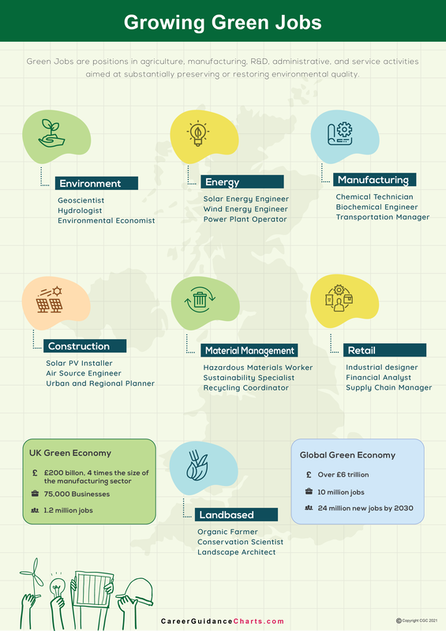 Click on the image to buy this poster. Click on the image to buy this poster. What are they? In recent years, as the need for climate change action has risen, we have witnessed the emergence of Green Jobs. This refers to all those roles dedicated to tackling climate change, from chemical engineers working within the renewable energy industry to solar panel technicians and low-carbon farmers. The United Nations Environment Program defines Green Jobs as “work in agriculture, manufacturing, research and development, administrative, and service activities that contribute(s) substantially to preserving or restoring environmental quality.” Green Jobs are essential in the fight for planetary protection. What sectors do they cover? Due to this overarching goal of preserving the environment, Green Jobs can be found across a range of sectors:
Green jobs in a post-Covid world This trajectory of growth in Green Jobs has been on the rise, with the UK Government aiming for 2 million more by 2030, and this has been accelerated further by the recent Coronavirus pandemic. Whilst this event was undoubtedly catastrophic, devastating the economy and turning the job landscape into a sort of economic graveyard, we are coming out the other side in a rather unusual position. Due to the increased rates of redundancy and job insecurity, we can actually now re-build and reconfigure the makeup of the job world in a different way. By shifting the focus to promoting the welfare of the planet, jobs that previously did not fall under the ‘green’ label can be enveloped within the industry. We have the chance to “build back better” as emphasised by the G7 Ministers during their meeting on Climate and Environment. Attitudes are already transitioning to a more green outlook, and now we have the opportunity to align this with the economy. For instance, large corporations like Nike and IKEA are already taking up more sustainable practices, such as sourcing from sustainable foresters and redesigning boxes to reduce packaging. Also, the organisation Green New Deal UK has released data showing that the 813,000 jobs lost over the course of the pandemic could be counteracted by a rise in Green Jobs. Hence, despite the pandemic being a devasting force on peoples’ livelihoods, we could use this as an opportunity to reinvent the world of work in a way that not only protects the environment but ensures greater job security for more people. A new meaning for 'Green Jobs' In response to the pandemic and shifting attitudes, Green Jobs are starting to transcend their traditional sectors and infiltrate the rest of the economy. Existing jobs are being reconfigured to achieve sustainable and green production and processes (recall the previous example of Nike and IKEA). As stated by James Watts, co-founder of BrewDog, “Sustainability should not be a bolt-on; it needs to be a core part of everyone’s role, regardless of their job title.” More and more jobs are placing green values at the heart of their philosophies, even those not directly involved in environmental work. From a study by the graduate recruitment app Debut, it was discovered that 89% of female and 80% of male students say that they only wish to work for organisations with a strong environmental policy. Even if the job itself is not labelled “green”, people are still seeking jobs that maintain the associated principles. So perhaps we require a new definition. The title of ‘Green Jobs’ is no longer limited to those specific roles that function within the various environmental sectors. It has become a term representing the global transition to a greener economy. Next steps.... A question still remains; how do I actually get into a Green Job? As with any career, there are certain things you can do to make your way into the industry and the same goes for Green Jobs. This can range from getting involved with projects and events in your local community, to enrolling on relevant courses or internships, to utilising platforms like LinkedIn to build connections with people already in the industry. However, here I will provide some specific examples of pathways into a Green Job to highlight the routes one might take to enter the industry.
*Landbased industries covers a range of roles from farming to animal care, forestry or conservation.
0 Comments
|
Russ BannerI have 10 years experience of working in careers guidance and am director of CGC. We publish career infographics for schools and colleges Archives
November 2022
Categories |
|
|
